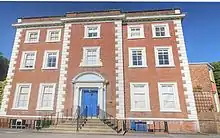Charles Holland (physician)
Charles Holland FRS MD (1802–1876) was a British physician. He was elected Fellow of the Royal Society in 1837.[1]
Staffordshire background
He was the only son of Joseph Holland of Rodbaston, near Penkridge, Staffordshire, and his wife Elizabeth Wells. He succeeded his father in 1803.[2]
Rodbaston was an old manor, where the manor house of the 17th century was no longer extant in 1959, when it was mentioned in a Victoria County History.[3] The existing Hall is from the 19th century.[4] In 1831 Rodbaston Hall belonged to William Holland, with 180 acres (73 ha) of farmland.[3] He died in 1849, at age 58, and debtors to the estate were asked to make payment to Charles Holland at Rodbaston Hall.[5][6] In 1851 the Hall belonged to Charles Holland, who had sold it by 1852 to Thomas Shaw-Hellier.[3]
Stowe House, Lichfield, which he later called St Chad's House, was bought by Charles Holland from the banker Richard Greene in 1856.[7] Holland's address was given in 1860 as Lyncroft House, Lichfield;[8] but also in 1859 as Stowe House.[9]

Holland was one of the original trustees of the Gilchrist Educational Trust. His place was taken in 1865 by Richard Leigh Holland, the elder son of William Holland of Streethay.[10][11] William Holland of Streethay (died 1839) was grandson of William Holland (died 1784) of Rodbaston Hall.[12]
Medical career
Holland studied at Edinburgh University, where he graduated MD in 1824.[2][13] became physician to the Islington Dispensary, and a Member of the Royal College of Physicians, licensed to practise in 1828.[13][14] His address was given by the Royal College of Physicians in 1845 as Queen Street, Mayfair, London.[15]
Family
Holland married, firstly in 1830, Anne Craufurd Paterson (died 1845), daughter of James Paterson MD of Ayr, and of Queen Street, Mayfair.[2][16] He married secondly, in 1849, Alice Baxendale (died 1851), eldest daughter of Joseph Baxendale.[2]
Notes
- Boase, Frederic (1892). Modern English Biography: A-H. Vol. I. Netherton and Worth. p. 1507.
- Walford, Edward (1860). The County Families of the United Kingdom, Or: Royal Manual of the Titled & Untitled Aristocracy of Great Britain & Ireland. Robert Hardwicke. p. 317.
- "Penkridge: Introduction and manors, British History Online". www.british-history.ac.uk.
- Parks and Gardens. "Rodbaston Hall - Wolverhampton". Parks & Gardens.
- "Died". Morning Herald (London). 12 April 1849. p. 7.
- "Willliam Holland, Deceased". Staffordshire Advertiser. 16 June 1849. p. 1.
- "Lichfield: Manors and other estates, British History Online". www.british-history.ac.uk.
- The London Gazette: The Appointed Organ for All Announcements of the Executive. 1860,1/6. H.M. Stationery Office. 1860. p. 773.
- House of Commons (1859). Accounts and Papers of the House of Commons. Ordered to be printed. p. 13.
- Gilchrist Educational Trust: Pioneering Work in Educatiion 1865–1930. Cambridge University Press. p. 30.
- "Married". London Evening Standard. 28 August 1857. p. 8.
- "Townships: Streethay with Fulfen, British History Online". www.british-history.ac.uk.
- The London and Provincial Medical Directory. Churchill Livingstone. 1851. p. 397.
- Royal college of physicians of London (1868). List of the fellows, members, extra-licentiates and licentiates. p. 50.
- Medical Times. J. Angerstein Carfrae. 1845. p. 21.
- "Married". English Chronicle and Whitehall Evening Post. 5 August 1830. p. 3.